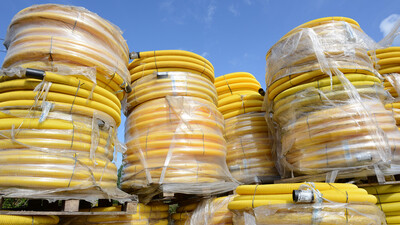General Information
Q: What types of plastic are commonly used for water and gas pipes in the UK?
A: The most commonly used plastics for water pipes in the UK are Polyvinyl Chloride (PVC), Chlorinated Polyvinyl Chloride (CPVC), Cross-Linked Polyethylene (PEX), and Medium-Density Polyethylene (MDPE). For gas pipes, Polyethylene (PE), Cross-Linked Polyethylene (PEX), and MDPE are widely used.
Q: Why are plastic pipes preferred over traditional materials like metal?
A: Plastic pipes are lightweight, corrosion-resistant, easy to install, and generally less expensive than metal pipes. They also have a long lifespan and are less prone to scaling and buildup.
Installation and Usage
Q: Can plastic pipes be used for both hot and cold water supply?
A: Yes, CPVC and PEX pipes are suitable for both hot and cold water supply due to their resistance to high temperatures. PVC is typically used for cold water applications, while MDPE is commonly used for cold water and underground services.
Q: Are plastic gas pipes safe for indoor use?
A: Yes, plastic gas pipes like PE, PEX, and MDPE are safe for indoor use when installed according to local codes and standards. They are often used for outdoor underground applications but can be used indoors with proper precautions.
Q: How are plastic pipes joined or connected?
A: Plastic pipes can be joined using various methods, including solvent cementing (for PVC and CPVC), crimping or clamping (for PEX), and electrofusion or butt fusion (for PE and MDPE).
Q: What tools are needed for installing plastic pipes?
A: Installation tools can vary depending on the type of plastic pipe. Common tools include pipe cutters, crimping tools, solvent cement and applicators, and fusion machines for PE and MDPE pipes.
Durability and Maintenance
Q: How long do plastic pipes last?
A: Plastic pipes can last anywhere from 50 to 100 years depending on the type of plastic, installation quality, and operating conditions.
Q: Are plastic pipes resistant to freezing temperatures?
A: PEX pipes are particularly resistant to freezing temperatures and can expand without breaking, making them suitable for areas prone to freezing. PVC and CPVC pipes are less flexible and more prone to cracking if frozen. MDPE pipes also have good resistance to low temperatures and are often used for underground services to avoid freezing issues.
Q: Can plastic pipes be repaired if they are damaged?
A: Yes, plastic pipes can be repaired. Methods include using repair clamps, couplings, or replacing the damaged section. Specific repair techniques depend on the type of plastic pipe.
Health and Safety
Q: Are plastic water pipes safe for drinking water?
A: Yes, plastic water pipes like PVC, CPVC, PEX, and MDPE are safe for drinking water as long as they meet the standards set by organisations such as the Water Regulations Advisory Scheme (WRAS). They do not leach harmful chemicals into the water.
Q: Do plastic pipes affect water taste or odour?
A: High-quality plastic pipes like PEX and CPVC do not impart any significant taste or odour to the water. Any initial odour usually dissipates after the system is flushed.
Environmental Impact
Q: Are plastic pipes environmentally friendly?
A: Plastic pipes have a lower environmental impact during manufacturing and transportation due to their lightweight nature. They also require less energy to produce compared to metal pipes. Additionally, many plastic pipes are recyclable.
Q: How do plastic pipes perform in terms of energy efficiency?
A: Plastic pipes have lower thermal conductivity compared to metal pipes, which helps in maintaining water temperature more efficiently. This results in reduced energy consumption for heating water.
Regulations and Standards
Q: What standards govern the use of plastic pipes for water and gas in the UK?
A: Various standards regulate plastic pipes, including British Standards (BS), European Standards (EN), and regulations by WRAS for water pipes. For gas pipes, standards like BS 7838 and the Institution of Gas Engineers and Managers (IGEM) regulations are relevant.
Q: Are there any specific regulations covering plastic pipe installation?
A: Yes, the installation of plastic pipes must comply with local building codes and standards. These codes ensure proper installation, safety, and performance of the piping systems.
Innovations and Future Trends
Q: Are there any new developments in plastic pipe technology?
A: Recent innovations include enhanced PEX pipes with improved flexibility and higher pressure ratings, while the development of bioplastics made from renewable resources offers an environmentally friendly alternative.
Q: What is the future outlook for plastic pipes?
A: The use of plastic pipes is expected to grow due to their cost-effectiveness, durability, and environmental benefits. Advances in material science and manufacturing processes will likely further enhance their performance and sustainability.
We hope you have found this information interesting and helpful. If you have any further questions you are always welcome to call our friendly team of experts on 01420 555600 or email [email protected].
Also, look out for more articles in our ongoing series of blog posts, bringing you useful information, insights, guides and tips on all things drainage!

Written by
Bob Stone
Technical Sales
Heading up our Technical Estimating Department, Bob is our in-house quantity surveyor.

